By Sue Lowe, Senior Learning Designer
What is PDP?
The OU Student employability policy states that all students are entitled to be supported in Personal Development Planning (PDP) (Open University, 2011).
The OU defines PDP as a framework to support students in their analysis of and development of their own skills, and a means of collecting evidence for use in the workplace (Open University, 2017). The Quality Assurance Agency (QAA) defines PDP as a “structured and supported process undertaken by a learner to reflect upon their own learning, performance and/or achievement and to plan for their personal, educational and career development” (QAA, 2009).
Expanding this, the OU careers team advise students work through five stages of PDP – Identify, Plan, Act, Record, Review (Figure 1, Open University, 2017) which ties in with the process recommended by the QAA (2009). Further, the QAA (2009) defines PDP as a process undertaken by students in relation to three areas – personal, professional, academic (Figure 2).
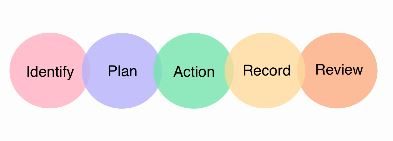 Figure 1: Five stages of PDP
Figure 1: Five stages of PDP
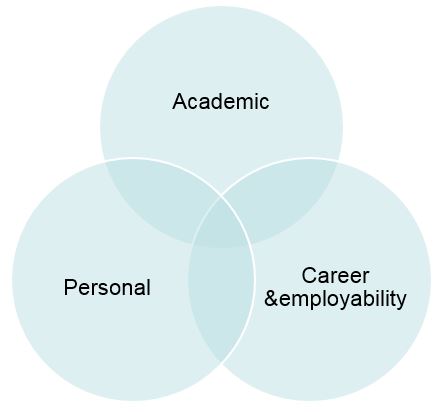
Figure 2: Three areas of PDP
Background
My exploration into OneNote to support PDP began when several module teams I was working with asked me about tools they could suggest students use to take notes, to carry out self-assessments and to reflect on their progress. At the time – going back a couple of years – this was a gap. My instructional design qualification and study of H819 The critical researcher: educational technology in practice both taught me that a defined gap starts a process of exploration.
Step 1 in this process involved a perhaps more traditional OU approach of developing an in-house resource. This was for the Open Degree programme and working with various colleagues in the Open Degree team, Learning and Teaching Innovation (LTI) and Careers. We produced an html5 asset (Figure 3) and Structured Content activities/guidance. The aim was for students to establish where they had gaps in relation to the seven employability skills, and plan for and carry out work to improve weaknesses and build on strengths. This is a solid first step, but now, looking back, it doesn’t provide a space for students to make notes and upload work they’re proud of, or to reflect on tutor feedback.
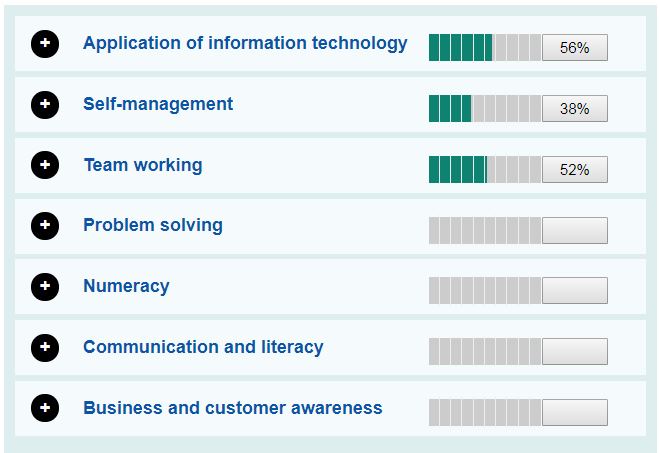
Figure 3: Interactive skills audit tool
Step 2 involved working with Maria Luisa Perez Cavana, a language academic in the faculty of WELS who was keen to trial an external eportfolio tool, EPOS, developed by the University of Bremen and which we adapted to suit OU PDP (Figure 4). We ran a pilot on L161 Exploring languages and cultures in which we explored students’ reactions to the concept of PDP in its complete sense (as in the QAA definition, not ‘just’ reflecting on the academic elements of a single module but relating to the three developmental areas and the five stages of the process), how specially designed activities might help steer them through the – admittedly – complex process, and whether a separate space – an eportfolio – might help. While students found the concept of PDP challenging in the beginning, the more they worked with it, the more they could see its benefits and the easier it became. The tool was a hit in the sense of having somewhere to do this stuff, but not in the sense it was a tad complicated to use. (The report is available on the OU Scholarship exchange.)
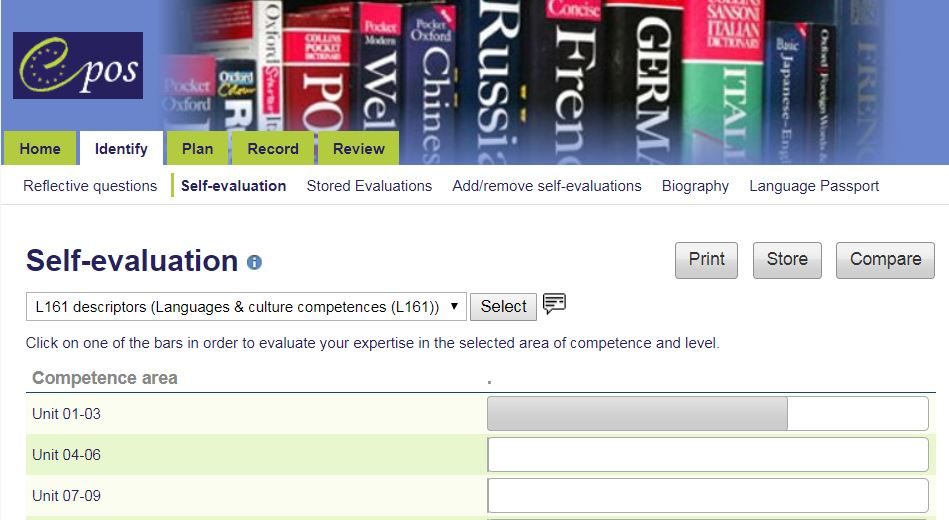
Figure 4: EPOS eportfolio tool
Step 3 evolved from the fact that OU students now (since Spring 2018) have the opportunity to access Office 365 for free via StudentHome. Part of the Office 365 suite of tools is OneNote and talking to several TEL colleagues, we established that OneNote would be worth investigating. In line with the work the Enhanced Employability and Careers Progression (EECP) team are doing around promoting employability, OneNote is a tool students are likely to be familiar with in their professional – and personal – spheres. Consequently, as part of the usual Learning Design process for the three new Level 2 language modules (L222, L223 and L226), Maria Luisa and I carried out developmental testing with students. (The report is available on the OU Scholarship exchange.) We’re also working with three other module teams (L116 Spanish studies 1, E209 Developing subject knowledge for the primary years and EE812 Educational leadership: exploring strategy) as part of a cross-WELS scholarship project. In all these cases, we are exploring the use of OneNote for PDP. Here’s what we’re trialling…
OneNote
We wanted to replicate the things that worked well in the L161 pilot whilst simplifying the student experience. We recreated the tabs to represent the stages in the OU PDP process. Under each of those tabs were a small number of pages with minimal frameworks (Figure 5). We exported the notebook we had created and provided this to students. Once students had set themselves up with an Office 365 account and had access to OneNote, they could install the template we had created. Students were directed to the relevant tabs and frameworks within the template by activities provided in Structured Content on a VLE website. The activities serve as a bridge between module and student PDP space.
The cross-WELS scholarship project is still underway, a report should be available in the summer. Initial impressions are that these students do see the benefit of PDP and ask for time to be allocated to it. Once they’re into the OneNote template they find it easy to use, in fact they find OneNote easy to use in general. So far so good. One issue though is the template file format is not compatible for Macs. (We estimate about 10% of OU students are currently Mac users.) Another issue is that students who already have an Office 365 account sometimes found it difficult to locate the template once installed. Not so good. However, I would like to explore solutions in Step 4. I still believe OneNote is a useful tool in supporting students in PDP.
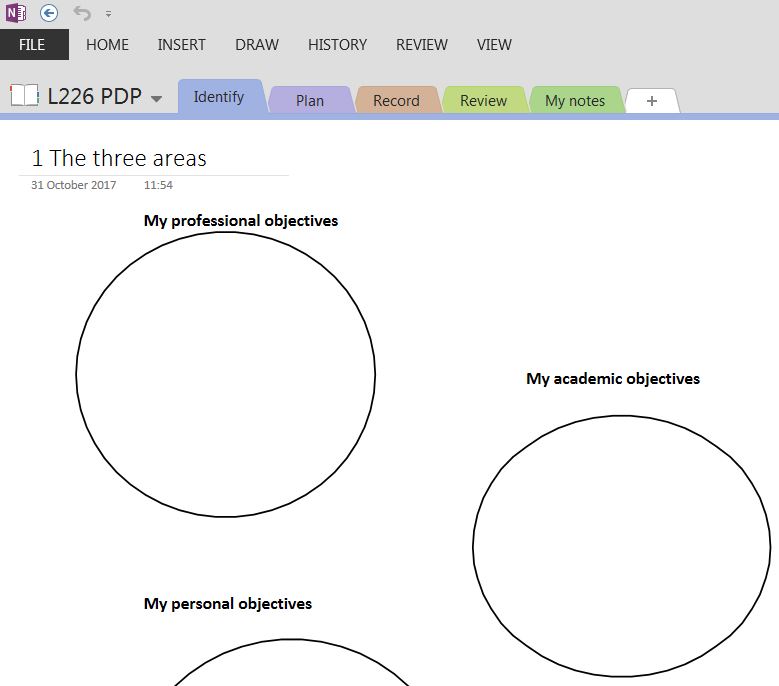
Figure 5: PDP tabs in OneNote
Step 4 (proposed). Why not continue to guide students through their PDP via activities on module websites. Why not continue to suggest students use OneNote to collate their plans, evidence and reflections. However, perhaps we should not necessarily provide a template, instead leaving OneNote as an entirely student-owned space (Weller and Sclater, 2016), an idea I explored when studying H800 Technology-enhanced learning: practices and debates, part of my OU Master’s in Online and Distance Education. Yes, suggest how students might want to structure the notebook, such as having the tabs to represent the PDP process, but leave the rest up to them. This should avoid issues of Mac compatibility; avoid issues of templates being misplaced between different accounts; and, importantly, it should enable students to use the same digital space throughout their entire degree, and beyond, because it will not be tied to individual modules via a template. To promote this idea further, why not place PDP guidance on the subject (qualification) websites? This is what we’re going to be exploring next in WELS…
For further information, please contact Sue Lowe (Twitter: @DisEdTech,) or the OU Learning Design team in TEL (LTI-LearningDesign@open.ac.uk).
References
Open University (2011) ’Student Employability Policy Statement’, Essential documents. Available at http://www.open.ac.uk/students/charter/essential-documents/student-employability-policy-statement
Open University (2017) ‘Personal development plan (PDP)’, Develop your career. Available at http://www2.open.ac.uk/students/help/pdp
QAA (2009) Personal Development Planning: Guidance for institutional policy and practice in Higher Education, The Quality Assurance Agency. Available at: http://www.qaa.ac.uk/en/Publications/Documents/Personal-development-planning-guidance-for-institutional-policy-and-practice-in-higher-education.pdf
Weller, M, and Sclater, N. (2016) ‘Weeks 21-22 Debate about VLEs versus PLEs’, Sclater/Weller podcast, H800 Weeks 21/22 Implications and future trends [Online]. Milton Keynes, Open University

